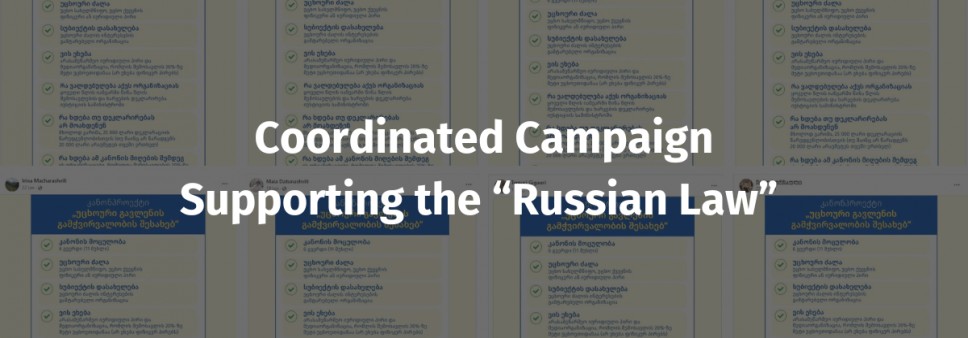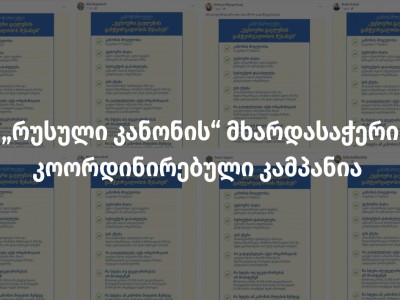Coordinated Campaign Supporting the “Russian Law”
During a press briefing held on April 3, 2024, the executive secretary of the ruling party, Georgian Dream, announced the intention of the parliamentary majority to reintroduce the "Foreign Agents’ Law." Under this law, organizations receiving more than 20% of their funding from abroad will be classified as entities serving the interests of foreign powers. These organizations will be mandated to register as such, and failure to comply will result in financial sanctions.
The draft law on "Transparency of Foreign Influence" was initially introduced last year by "People's Power," a political faction within the parliamentary majority. Although the law garnered support from 78 MPs during the first reading, it faced significant public backlash, leading to massive protests and ultimately prompting the majority to withdraw the proposal. Despite assurances from representatives of Georgian Dream that they would not revisit the law, it has resurfaced. Similar legislation is already in effect in Russia, contributing to the erosion of independent media and civil society organizations.
After Mamuka Mdinaradze’s statement, the Goverment of Georgia, Georgian Dream, Pro-government media outlets and anonymously operated social media pages initiated a sponsored campaign on social media concerning the draft law. Advertisements were posted on the following pages: “საქართველოს მთავრობა", „ქართული ოცნება/Georgian Dream”, „ირაკლი კობახიძე/Irakli Kobakhidze“, „შალვა პაპუაშვილი • Shalva Papuashvili“, „TV Imedi“, „POSTV - ანალიტიკა“, „POSTV - ახალი ამბები“, „Newshub.ge - ნიუსჰაბი“, „სინამდვილეში“, „ქართული ოცნება ჩემი არჩევანია“, „Bidzina Ivanishvili for Georgia“, „პოლიტიკური სატირა/Political Satire“, „პოლიტიკური აბსურდი“, „აგენტურა“, „ციტატა“, „PrimeNews.Ge”.
120 advertisements were published on Facebook pages and Instagram accounts, featuring informational images (cards) that manipulatively explain the scope of the law and its targets. The message conveyed through the campaign suggests that the law aims to promote transparency, but crucial contextual information is deliberately obscured.
Sponsored posts on pro-governmental Facebook pages feature statements from members of the Georgian Dream party. On the "POSTV—ახალი ამბები" (POSTV—NEWS) page alone, over 40 quotes are attributed to figures such as Mamuka Mdinaradze, Shalva Papuashvili, Irakli Kobakhidze, and other representatives of the parliamentary majority. In their statements, members of Georgian Dream accuse civil society and donor organizations of refusing to disclose their financial information transparently.
Shalva Papuashvili: “When a foreign organization enters Georgia, regardless of whether it comes from the West, East, North, or South, and claims to have the best interests of Georgian society at heart, we have the right to understand what they are. If someone is concealing information, they must be hiding something”.
Sponsored posts by pro-government actors and anonymously operated pages between April 3-4 included discrediting messages aimed at opposition politicians, donor organizations, and civil society actors. Additionally, some of these posts contained sexist and homophobic content too.
Agentura: X
Political Absurd: Citizens of Georgia! Those “grant seekers” on the photo continue to brainwash your children. They get millions for promoting homosexuality, as well as destroying Georgian identity and humiliating our religion. We have a right to know the purpose of solid funding these political prostitutes receive.
POSTV-ანალიტიკა: Tbilisi Pride was one of the first who referred to the transparency law as the Russian.
POSTV-ანალიტიკა: Damon Wilson, President of the National Endowment for Democracy (NED) in the US; "The reintroduction of the Russian-style Foreign Agents’ Law, just one year after it was rejected by Georgian society, seeks to discredit civil society and contradicts Georgia's aspirations to join the Euro-Atlantic democratic community."
POSTV-ანალიტიკა: We need transparency!
On April 4, pro-government media organizations spread disinformation content, insinuating about Georgia’s worsened civil society index ranking. The post was sponsored by the POSTV news (POSTV - ახალი ამბები) page. According to the Fact Meter, V-DEM’s core civil society index assesses the enabling environment for civil society and does not rank a country’s civil society capacity. Thus, Georgia’s worsened standing in this index does not diminish the CSOs activities but reflects the worsened environment for civil society organizations, worsened by the Government of Georgia. This content is no longer available on TV Imedi’s Facebook page. POSTV’s sponsored post was labeled as a violation of the platform standards, and Meta halted spreading the ad.
On April 4, pro-government media organizations disseminated disinformation content suggesting a decline in Georgia's civil society index ranking. The post was sponsored by the POSTV news (POSTV - ახალი ამბები) page. According to Fact Meter, the V-DEM's core civil society index evaluates the enabling environment for civil society and does not rank a country's civil society capacity. Therefore, Georgia's decreased standing in this index does not reflect the declining impact of CSOs' activities but rather indicates a deteriorating environment for civil society organizations caused by the Government of Georgia’s policies. This content has since been removed from TV Imedi's Facebook page and is no longer accessible. POSTV's sponsored post was deemed a violation of platform standards, leading Meta to halt its dissemination.
POSTV ახალი ამბები - (POSTV NEWS): Georgia's civil society ranking has declined significantly by 50 points according to the V-DEM's Civil Society Index, dropping to the 77th place from its previous position at 27th.

POSTV ახალი ამბები - (POSTV NEWS): Georgia's civil society ranking has declined significantly by 50 points according to the V-DEM's Civil Society Index, dropping to the 77th place from its previous position at 27th.

TV Imedi: Georgia's civil society ranking has declined significantly by 50 points according to the V-DEM's Civil Society Index, dropping to the 77th place from its previous position at 27th.
Discrediting posts targeting civil society organizations and media outlets critical of the government were sponsored by one of the Facebook page associated with the Georgian Dream, called "სინამდვილეში" (Sinamdvileshi). Additionally, content discrediting a media outlet was sponsored by "POSTV - ახალი ამბები" (POSTV News) too.
"სინამდვილეში" (Sinamdvileshi): NGOs funded from abroad and their leaders joined the campaign against the draft law on transparency of foreign interest. They launched a disinformation campaign on “Twitter” platform. In fact, foreign-funded NGOs have aligned themselves with the radical opposition’s and certain media outlets’ anti-Georgian disinformation campaign.
"სინამდვილეში" (Sinamdvileshi): Propagandistic media outlets, including “Mtavari Arkhi”, “TV Pirveli”, “Formula”, “Publica”, “Netgazeti” and “Radio Tavisupleba” try to discredit the draft bill on the transparency of foreign interest and refer it as Russian.
POSTVახალი ამბები (POSTV NEWS): The Georgian Dream’s Strategic Communication platform, “Sinamdvileshi,” published a post revealing who discredited the draft law on the transparency of foreign interests. Propagandistic media outlets, including “Mtavari Arkhi,” “TV Pirveli,” “Formula,” “Publica,” “Netgazeti,” and “Radio Tavisupleba,” try to discredit the draft bill…
Sponsored posts distributed on April 3-4 focused on the draft law's content. Informational images/cards that manipulatively explained the details of the law were sponsored on the pages of Shalva Papuashvili, various media outlets, and anonymously operated Facebook pages and Instagram accounts. Most of these cards promoted similar content, differing only in their design.

Agentura: #Don’t be fooled! The countries where the transparency law is being enforced and the countries where the discussion on the same law has already started:
Agentura: #Don’t be fooled! How the opposition lies about the transparency law: It is Russian! The law will apply to farmers!
Political Absurd: What’s Russian in this law when it is only concerned with transparency?
POSTV News: Learn more about the transparency law
TV Imedi: The draft law on transparency: The Name of the draft law - “The Draft Law on the Transparency of Foreign Influence”. Foreign Power - Foreign state, foreign physical or legal person.
Newshub.ge: Who does the transparency draft law apply to and who doesn’t
In the campaign supporting the draft law on Transparency of Foreign Influence, not only national and regional representatives of the ruling party but also public servants working in municipal governance bodies were involved. Across the country, employees of local self-government bodies, hired through service or labor agreements, began disseminating identical cards on their personal Facebook accounts. ISFED uncovered 96 public servants employed in 30 municipalities who publicly shared the same cards on their Facebook accounts during April 3-4, 2024.




The Draft Law
“Transparency of the Foreign Influence”
The size of the draft law: 6 pages (11 articles)
Foreign Power: Foreign state, foreign physical or legal person
Name of the subject: The organization serving the interest of foreign power
Who does it apply to: Non-commercial legal entities and media organizations that derive more than 20% of their income from abroad (this does not apply to individual persons).
What does the law mandate: Every January, an organization must disclose its annual income and expenditure to the Ministry of Justice.
What if one does not decleare: Only penalty - failure to declare the financial information will result in a penalty of 25,000 GEL (repeated failure will add a penalty of 20 000 GEL, to be imposed no more than once a month).
What happens after the adoption of the draft law: Organizations, having more than 20% of their income from foreign sources in 2023, will have to disclose their financial information within three months after the enforcement of the law.
















